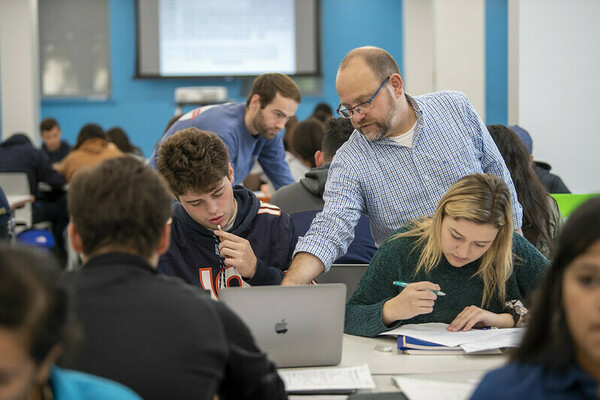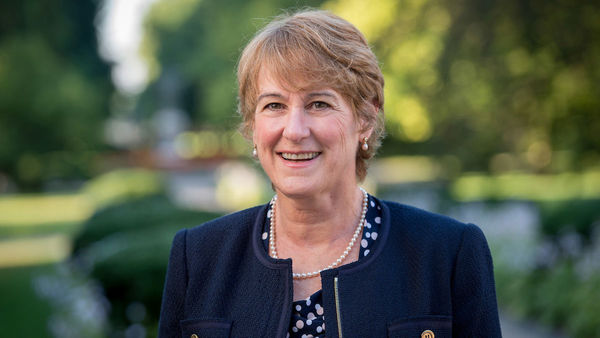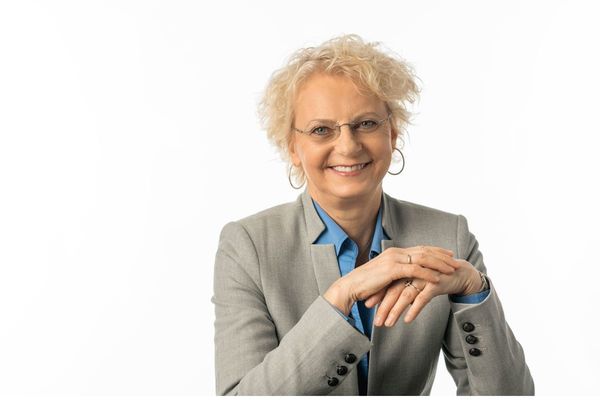
Junior Chelsea Popoola was accustomed to small class sizes at her high school in Connecticut, and was frankly a little apprehensive about what her classes would be like at Notre Dame – especially in terms of class size -- when she arrived in 2018.

But an email in her inbox, offering her a chance to apply for the Science and Engineering Scholars program after her acceptance to Notre Dame, offered her a lifeline that turned out to be even more helpful than she knew at the time.
The Science and Engineering Scholars Program began during the 2018-2019 school year, and was developed for highly motivated freshmen who would thrive at the University if given the benefits of personalized academic support and a sense of community. The students who were invited to apply were identified during the admissions process because they graduated from high schools that had fewer options for Advanced Placement courses, particularly in chemistry and calculus.
“This program is, wow,” said Popoola, a math major who plans to attend medical school. The small classes allowed her to learn the material in a tight-knit environment. “I wish I had better words to explain how much this program has done for me. Whenever we need help with anything, there are many people willing to help.”
The idea for the program started after deans identified that about one-third of students who said they wanted to graduate with majors within the College of Science ended up transferring out of the college by the end of their sophomore year. Careful analysis showed that it wasn’t a problem of ability, but a problem of an uneven starting point. Focus groups have uncovered that these students did not just have a change of heart about their major, but rather felt they had failed in science and had no alternative but to switch.
“That was a huge shift in their career goals, and we began to think how to change it,” said Malgorzata Dobrowolska-Furdyna, director of the program and a professor in the Department of Physics. She, along with Mary Galvin, the William K. Warren Foundation Dean of the College of Science, and Dan Gezelter, associate dean for undergraduate studies in the College of Science, developed the program with others from the office of the Dean of Engineering, first-year advisors, and others.
The Program
In its first year, which began in fall of 2018, the Science and Engineering Scholars program admitted 45 students who worked in small-class settings in calculus, chemistry, and physics, with the help of dedicated mentors. Students identified for the program were offered the opportunity to apply before their freshman year. Those who were accepted took an online calculus refresher course over the summer.
During their first and second semesters, they stayed with their cohort in small classes that offered personalized attention and mentoring, and also took two additional credit hours in critical thinking. Science and engineering students split classes during the second semester, with engineering students taking physics and science students in the program taking organic chemistry.
Success in the program is defined as a grade of a C+ or higher, and the students in the program outperformed those in the control group – which consists of students who were invited to apply for the program but did not. After the first year, 80 percent of the students in the Scholars program achieved at least a 3.0 GPA compared with 61 percent in the control group. Also, 20 percent more scholars stayed on track with their program – meaning they maintained the sequence in which classes for their major need to be taken.
The Covid-19 pandemic and subsequent move to online learning during Spring 2020 made the statistics from the second cohort of students more difficult to quantify, in part because all students at Notre Dame had the opportunity to take a grade of pass/fail rather than a letter grade. Still, the team noticed that 93 percent of students in the Scholars program stayed with their majors in science and engineering, compared with 79 percent of those in the control group.
The program works for several reasons, Galvin and the students say.
“They’re taking the same classes, the same exams as other students, but by giving them extra hours and tutoring, we’re spreading out course material over time with one faculty member,” Galvin said. “They’re in a class that’s small enough so they’re comfortable asking questions.”
Kirsten Williams, a neuroscience and behavior major, applied to the program because of the small class size, and also because she thought being in the program would be a good way to become more connected with others at Notre Dame. The sophomore from Coral Springs, Florida wants to go to medical school after graduating, but did not take AP chemistry in high school because students who took it were not passing the exam.
During her classes with her cohort last year, she got As in calculus 1 and 2, “and I never thought I would get an A,” she said.
She feels like after the first year, the program has continued to help her because she will be able to work with mentors to find more research opportunities as well.
“It opens a lot of doors for the future,” she said. “Having this system of support in place is so helpful, because the connections we make here will help with getting internships and research opportunities.”
Pia Martindale, a junior biochemistry major who also hopes to attend medical school, said her experience in meeting friends and study partners during her freshman year was one of the more beneficial parts of the Science and Engineering Scholars program. Those perks provided her with a good transition to college life.
“I also loved getting to know my professors,” said Martindale, from New York City. “Professors here at Notre Dame, if you email any professor, they will always find time to meet with you, but it was even easier since I already knew some of them through the program.”
The success of the Scholars program allowed it to grow to 80 students during the fall 2020 semester, up from 45 the previous two years. To accommodate the larger cohort of students, the program hired an additional math professor, and distributed the chemistry course load across that department. The program also expanded into the sophomore year, adding critical thinking classes for physics as well as organic chemistry II.
Though there are now 80 students, 150 had applied for the program, indicating the need to grow further in the future, Galvin says.

Humble beginnings
She and Dobrowolska-Furdyna both understand, professionally and personally, how important it is to reach students early and take corrective action before the students become overwhelmed. It’s one of the reasons they embarked on developing the program.
Galvin recalls connecting with an undergraduate student with whom she was paired during a retreat for students and academic administrators in New Orleans before the Science and Engineering Scholars program had started at Notre Dame. The student graduated from a high school with no AP courses, and expressed how difficult introductory science courses in college were.
“He was exceptionally bright, and labeled as gifted as a child, but without the background access to quality preparation, he was really struggling,” Galvin said.
Around the same time, Galvin had been examining, and fretting over, the retention of students in the College of Science. She and

Dobrowolska-Furdyna had been mentoring students, but one in three were leaving the College of Science, most often changing their majors to other fields in the College of Arts and Letters. Research through five years of data, plus focus groups, showed that students who didn’t receive AP credit in science or math courses often struggled, and Galvin and others realized the reasons were often related to lack of preparation and not to drive or intelligence. And the crisis of confidence breeds lower grades and fewer opportunities because of it.
Galvin knows something about having a crisis of confidence, albeit in a different way. She was a first-generation college student without the benefit of attending a high-powered high school, but there were additional issues.
“It wasn’t so much college, but I can identify with some students because I am dyslexic,” she said. “But this was back in the day when they didn’t diagnose it.” During elementary school, she struggled, and even had the experience of a teacher hinting that she probably wasn’t college material. She knew better, but the side effect of that comment lasted with her through the application process for her doctoral degree when she sought out a letter of recommendation from a faculty member. She worried she could fail, but he saw through her lack of confidence.
“I told him I would try for my Ph.D. and if I failed, that would be okay,” she said. “And he said, you couldn’t fail if you tried…even if that was your goal, you wouldn’t make it. And yet, I still felt ‘dumb,’” she said.
She was grateful for the many people who mentored her through her school career, and Dobrowolska-Furdyna has felt the same. There were 300 students in her physics class at Warsaw University, where she attended. She was drowning. She also felt “dumb” and didn’t want anyone to know how she felt, but she began working with a private tutor and worked hard. Two hundred of her classmates dropped the class – but not her.
“I did survive, and I would never, ever deny help to a student who wants to work hard,” she said.
Cesar Sanchez, from Chicago, is a first-year student majoring in statistics through the Department of Applied and Computational Mathematics and Statistic. His father has always encouraged him to do the hard work now to make things easier later. Sanchez remembers receiving an email to join the Science and Engineering Scholars program, and his father predictably encouraging him to join for the rigorous classwork and more personalized instruction.
He has felt that his grades are better than they would be if he had been in the larger lecture classes, but he likes the mix of students he sees in the program’s classes.
“One of the biggest benefits is the amount of diversity among students in the classes,” said Sanchez, who hopes to go into sports analytics but is also interested in other areas of statistics – with the knowledge that there aren’t very many sports jobs available. “As someone who came from a diverse, inner-city area, I was used to seeing a lot of different faces.”
He’s been pleased with how the University has kept up with in-person classes and the Scholars program throughout pandemic, too. “Especially when dealing with chemistry, it’s been helpful to be here in person, and obviously that has been remarkable.”
As Dobrowolska-Furdyna transitioned into the role of the program’s first director this year, she looks forward to being able to expand it with more funding, believing at her core that it’s the best way to reach many students and propel them to careers in science and engineering.
“Working with students in this program is probably one of the most impactful things I have done in my life,” she said, beaming after talking about her mentees’ successes.
Originally published by at science.nd.edu on November 05, 2020.